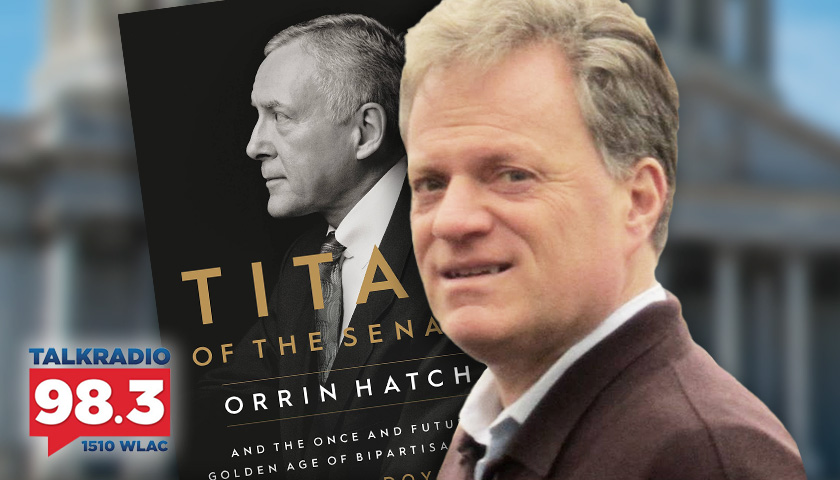Live from Music Row Monday morning on The Tennessee Star Report with Michael Patrick Leahy – broadcast on Nashville’s Talk Radio 98.3 and 1510 WLAC weekdays from 5:00 a.m. to 8:00 a.m. – host Leahy welcomed author William Doyle to the newsmaker line to give details about his new book, Titan of the Senate: Orrin Hatch and the Once and Future Golden Age of Bipartisanship, in which he highlights the senator’s legislative accomplishments and how political parties can work together.
Leahy: We welcome to our newsmaker line right now, author, fellow upstate New Yorker – I am. I think he’s maybe from the city and an Irish American – William Doyle. Welcome to The Tennessee Star Report. You’ve got a new book out about Orrin Hatch – Titan of the Senate.
Doyle: Hi. It’s great to be with you. Thank you. Titan of the Senate just came out and it’s an examination of Orrin Hatch’s impact as a United States senator.
Leahy: Your first job was as an intern on Capitol Hill for U.S. Senator James Buckley, a conservative. I remember when he was elected. Are you from New York City, or where are you from originally?
Doyle: I was born and raised on the Lower East Side of Manhattan. And that’s right, that was my first job in college in Washington, D.C. And I spoke with former Senator James Buckley, who later became a federal judge not that long ago.
He’s close to 99 and he’s a fascinating example of a type of conservative I think that … I admire a great deal. And he did not overlap with Orrin Hatch.
But there are some very interesting through lines all the way through, your historic involvement in the Tea Party and through to today, to watch how conservatism evolves and helps shape our history.
Leahy: Your new book about Senator Orrin Hatch – how and why did you decide to write a book about Orrin Hatch, the senator from Utah for many years?
Doyle: Yes, for 42 years, actually, the longest-serving Republican senator in our history. I came across an analysis of his record by a nonpartisan think tank which concluded that Orrin Hatch was the most effective senator of the modern era, meaning post-Vietnam.
He also passed more legislation than any other senator. Almost 800 laws. But at the same time, he was certainly one of the strongest conservative voices in the Senate. And I found that to be an incredible paradox.
How do you pass so much legislation – which means you work with liberals and Democrats as well as Republicans – and become such a conservative icon who, of course, shaped the modern Supreme Court more than any other lawmaker, I would argue, because he was involved in so many confirmation hearings, including, by the way, Ruth Bader Ginsburg, who he was a great champion for in the mid-1990s because he respected her record. But she was a better candidate than other people. Bill Clinton wanted to be a member of the Supreme Court.
But as you know, he was always fighting for a constitutional amendment to balance the budget, always fighting for a constitutional amendment to ban abortion, both of which he did not succeed at, but he was a very faithful executor of the Reagan Revolution, and he wound up working with Ted Kennedy on four or five big achievements that I think are not left or right, but sort of nonpartisan and very pro-American. And my book is about five moments in American history, including several of those moments.
Leahy: This is Crom Carmichael, who’s our all-star panelist.
Carmichael: Just very quickly, because I love books where they pick particular topics and go into them in detail. What are the five topics?
Doyle: The first one was in the late 1970s, when Orrin Hatch – this is a largely forgotten moment, but a huge turning point in political history, I would argue – Orrin Hatch volunteered to take on the AFL-CIO and Jimmy Carter in what seemed to be a labor law reform bill that was going to give American unions dramatically expanded power beyond the powers they had under the Wagner Act of the Franklin Roosevelt years.
Orrin Hatch thought, if this law gets passed, the Republican Party will be dead, because it was already teetering after Nixon and Ford. A lot of people thought it was going to go extinct and that this law would bury the Republican Party and union dues going to Democrats.
And he raised his hand and said, I’ll try to stop this. And he led a filibuster, a kind of David-and-Goliath on the Senate floor that wound up actually stopping that thing in its tracks.
And as a result, American unions have had no significant expansion in power since that moment that Orrin Hatch stopped this in the late 1970s, at the federal level, that is. And that’s an example of how stopping a law can be a measure of effectiveness, depending on what your ideology is.
But the next four or so events are the Americans with Disabilities Act, which I would argue is very nonpartisan. Orrin Hatch gets no credit for this, but he saved that big civil rights bill, the biggest one since the 1960s, to honor the rights of our disabled fellow citizens.
He saved that on the Senate floor. It was about to get killed. And according to disability activists who told me in the year 2021 that if it wasn’t for Orrin Hatch, that never would have passed.
And he saved it on the issue, believe it or not, of gay rights and discrimination against homosexual Americans. Incredible story. I get into great dramatic detail on that in my book.
There was a similar event, which was the Ryan White AIDS Comprehensive AIDS Emergency Resources Act of 1990. Again, largely forgotten by many Americans, but that bill today, and its reauthorization, which Orrin fought hard with Ted Kennedy and Republicans and Democrats to pass, was a very tough battle. That law today benefits half a million HIV-AIDS patients in the United States…
Leahy: Crom has another question for you.
Carmichael: William, you may not know this, but here in Tennessee we have the Tennessee Titans. And it sounds a little bit like Orrin Hatch. His career during the first half of his career was stronger than the second half.
And our Tennessee Titans can’t seem to score in the second half. (Laughter) I’m just trying to make something funny here. That sounds like a very good book.
Doyle: Well, thank you. It’s an incredible story. And he also passed the Religious Freedom Restoration Act, which was embraced by the American Civil Liberties Union and most conservative groups.
And it was based on a bill introduced by Chuck Schumer in the House when Schumer was a representative. But Hatch tweaked it, he got it onto the floor and he passed it. And that became a model for defending religious liberty in America.
It got interrupted by Supreme Court decisions, but today has been reinforced and largely acts that way today. Now, it got very complicated with LGBTQ rights arguing against carve-outs for religious organizations.
But my point is that there are some issues, I personally think, that go beyond ideology and partisanship, and that they’re worth negotiating, compromising, and seeing if things can be brought not to the left or the right but sort of upwards and forward that can bring America forward.
And Hatch did that several times, and I think it’s kind of a model for the future. Maybe we should be getting together more than we do.
Listen to today’s show highlights, including this interview:
– – –
Tune in weekdays from 5:00 – 8:00 a.m. to The Tennessee Star Report with Michael Patrick Leahy on Talk Radio 98.3 FM WLAC 1510. Listen online at iHeart Radio.
Photo “William Doyle” by William Doyle. Photo “Titan of the Senate: Orrin Hatch and the Once and Future Golden Age of Bipartisanship” by Amazon. Background Photo “U.S. Capitol” by Mark Fischer. CC BY-SA 2.0.





